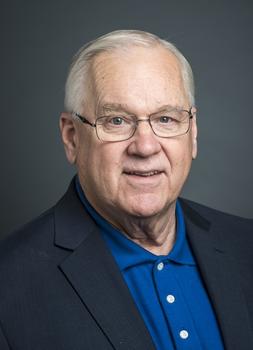This year, College of Public Health professor James (Jim) Metcalf joined some very rare company, becoming the fourth George Mason University faculty member to mark 50 years of service. Since joining the Mason Nation in August 1973, Metcalf has seen the university grow into the largest public research university in Virginia.
“When I came here, I was young and energetic,” says Metcalf, a professor in the Department of Global and Community Health. “Now I'm old and energetic, and I continue to love it here. It was always in the cards that George Mason would be something special.”
Metcalf earned his BS, MA, and PhD in physical education at the University of Maryland. He completed a minor in biological sciences during his undergraduate career, an applied statistics minor during his master’s degree, and earned a doctoral cognate in zoology over the course of his PhD.
He came to George Mason from Federal City College, now the University of the District of Columbia, where he was an associate professor and director of the school’s first-of-its-kind exercise physiology laboratory.
His early work across the university places Metcalf among the pioneers who helped make George Mason the interdisciplinary institution it is renowned for being today. Metcalf helped with the planning and formulating new courses and developing the curricula for writing-across-the-curriculum and the PAGE (Program for Alternative Education) program, served as a teacher consultant, and was part of a team of science faculty dedicated to alternative general education.
Metcalf describes that early faculty as enthusiastic and idealistic. “We built curricula and served on interdisciplinary committees. I connected with colleagues across disciplines and made many friends along the way.”
At George Mason, Metcalf began teaching exercise physiology and kinesiology in the Department of Health and Physical Education (HPE) in the School of Education and served as an instructional faculty across multiple departments. After his time in the HPE, Metcalf joined what was formerly the College of Nursing and Health Sciences teaching clinical physiology to nursing students. He also taught in the Honors College.

Shortly after coming to George Mason, Metcalf established a cardiac rehabilitation program alongside Fairfax cardiologist Robert Matthews, MD, with funding from the Virginia Department of Vocational Rehabilitation. The grant helped fund one student fellow each semester, and Metcalf was able to support numerous students with stipends to become cardiac fellows. The program still exists today and is operated by Inova Fairfax Hospital.
Metcalf currently teaches GCH 332 Health and Disease and GCH 360 Environmental Health, and as he has traversed across departments, his hopes for his students have never wavered. In his classes, Metcalf encourages student creativity and individual expression.
“I once had a student in one of my GCH courses who came to me and told me she was a painter. I had recently assigned an essay and she expressed to me she would like to do her essay as a painting. I said, of course, and she did it and came up with three magnificent acrylic paintings that really captured the theme of the novel the essay was for,” said Metcalf. “I want my students to have an open mind and to think for themselves. I say, think outside of the box, color outside of the lines. Take a walk on the wild side and sin boldly.”
In addition to teaching, Metcalf has published academic works on exercise physiology, cardiovascular rehabilitation, a textbook on aerobic and strength fitness, women and maternal health, nursing, and health education and writing. He is proud to have published works alongside his students on athletics and behavioral characteristics of athletes, particularly attack players in soccer.
He has recently been exploring a new potential research endeavor about the relationship between freedom and health, with a focus on the lack of equity in choice of medical care.
“I've been developing some classroom exercises where the students are asked to consider the relationship between freedom and health. In other words, if you can't choose your own provider, your own doctor or dentist, does that affect your health?” Metcalf said. “It is perhaps more philosophical than medical and has not been studied much.”
Over the course of his career, Metcalf was elected president of the Sports Medicine Association of Greater Washington, which later became a chapter of the American College of Sports Medicine, as well as a nonphysician president of the Physical Fitness Committee of the District of Columbia Medical Association.
Outside of teaching, Metcalf fueled his love for music by singing in George Mason’s University Chorale for more than 20 years and following along with the university’s various athletic teams.
Beyond teaching, Metcalf has also sat on the other side of the George Mason classroom as a student, auditing philosophy and physics courses, and continually seeking dialogue with colleagues across disciplines.
He remains as energized as he was when he first came to George Mason, and he looks forward to what the university has in store for its next 50 years.
“The 50 years I have been here at George Mason have been absolutely unbelievable in terms of where we've come from,” says Metcalf. “I was born at the right time and came to George Mason at the right time as it was just exploding. I’m thankful that I was here and along for the ride.”
Additional reporting by Shayla Brown.
Related News
- January 27, 2026
- January 21, 2026
- January 16, 2026
- September 30, 2025
- April 16, 2025
